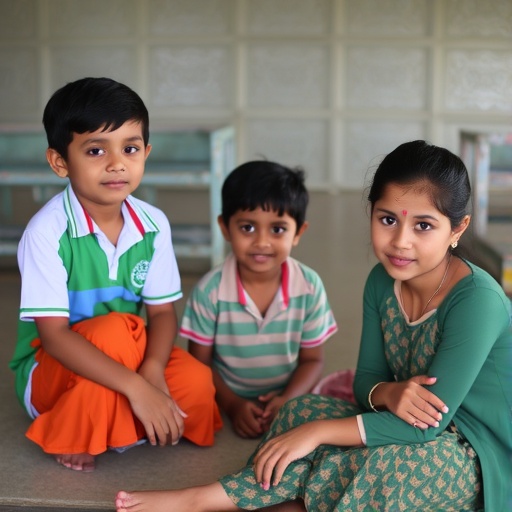In the rapidly evolving educational landscape of Bangladesh, a new study has emerged, examining the pivotal role of early childhood teacher training. Authored by prominent researchers Rahman, A., Islam, M.S., and Boyd, W., the paper titled “Exploring the Landscape of Early Childhood Teacher Training in Bangladesh” delves into the complexities and challenges faced by educators in this critical field. As the demand for quality early childhood education (ECE) surges, understanding the training environment for teachers becomes increasingly essential for policy development and educational reform.
At the heart of the exploration lies the inherent value of early childhood education. Numerous studies have confirmed that the foundational years of a child’s education significantly influence their lifetime learning and development. This research underlines how skilled teachers in early childhood settings create nurturing environments where children can thrive cognitively and emotionally. The enhanced focus on proper teacher training ensures that these educators are not just facilitators but are pivotal in shaping young minds during their formative years.
Despite the recognized importance of early childhood education, Bangladesh faces significant hurdles in adequately training its educators. The study investigates the existing training programs, identifying gaps in curriculum quality and practical teaching applications. Many programs fall short in equipping teachers with the necessary skills to deal with diverse classroom environments and the varying developmental needs of children. This deficiency raises concerns about the overall effectiveness of early childhood education in the country.
Rahman and his colleagues employed a range of methodological approaches to gather qualitative and quantitative data. Interviews with current educators, program administrators, and policy-makers offered insights into the strengths and weaknesses of existing training frameworks. The researchers meticulously analyzed these interviews alongside educational policies, revealing crucial information about the disconnect between training programs and the actual needs of classrooms.
A significant finding of the study is the disparity in training opportunities available to urban versus rural educators. While urban centers often have access to better resources and training facilities, rural teachers face isolation and a lack of professional development opportunities. This variance can lead to inequities in the quality of education that children receive based on their geographic location. Addressing this imbalance is vital for creating a more equitable educational landscape across Bangladesh.
Moreover, the researchers highlight the influence of cultural factors on teacher training in Bangladesh. Cultural norms and societal expectations can sometimes hinder progressive teaching practices. The study emphasizes the importance of integrating culturally relevant pedagogy into training programs to ensure that educators can connect effectively with their students. By valuing local knowledge and practices, teacher training can be more impactful and relevant to the communities they serve.
Another pivotal aspect of the research concerns the role of government policies in shaping teacher training efforts. The study scrutinizes the current regulatory framework, assessing its effectiveness in mandating quality standards for teacher training programs. Rahman and his team suggest that robust policy interventions are critical for elevating the standards of educational training, establishing a reliable foundation for early childhood education in Bangladesh.
The authors also address the necessity of continuous professional development for educators. While initial training is crucial, ongoing support and training are essential to keep teachers updated on the latest pedagogical strategies and educational trends. The research indicates a pressing need for structured professional development programs that not only enhance skills but also encourage teachers to stay engaged with their profession.
Another significant finding relates to the role of technology in teacher training. As digital tools become increasingly integrated into educational settings, the researchers argue that leveraging technology can enhance the efficacy of teacher training programs. Online resources and platforms can provide teachers with access to a broader array of materials and innovative teaching methods, bridging gaps in resources especially for rural educators who may be underserved in traditional training settings.
In light of these findings, the researchers recommend collaborative efforts among various stakeholders. Universities, government bodies, and non-governmental organizations (NGOs) must work together to develop a comprehensive strategy for early childhood teacher training. Such collaboration can ensure that programs are aligned with both global best practices and local needs, ultimately improving educational outcomes for young children in Bangladesh.
As the study concludes, the authors underscore the need for a culturally responsive, equitable, and continuously evolving framework for early childhood teacher training in Bangladesh. They argue that investing in quality teacher training is not merely an educational necessity but a moral imperative that impacts the future of society. By equipping teachers with the skills and knowledge they need, the nation can cultivate a generation of critical thinkers, innovators, and responsible citizens.
This study presents both a call to action and a hopeful vision for the future of early childhood education in Bangladesh. It serves as a vital resource for policymakers, educators, and researchers who seek to contribute to a transformative agenda for their educational landscape.
By fostering high-quality training programs for early childhood teachers, Bangladesh can lay a stronger foundation for its next generation, ensuring that every child receives the best possible start to their educational journey. As the landscape of early childhood education continues to evolve, the insights from this research will be invaluable in guiding the necessary reforms toward a brighter future for all.
Subject of Research: Early Childhood Teacher Training in Bangladesh
Article Title: Exploring the Landscape of Early Childhood Teacher Training in Bangladesh
Article References:
Rahman, A., Islam, M.S. & Boyd, W. Exploring the Landscape of Early Childhood Teacher Training in Bangladesh.
IJEC (2025). https://doi.org/10.1007/s13158-025-00427-3
Image Credits: AI Generated
DOI: 10.1007/s13158-025-00427-3
Keywords: Early childhood education, teacher training, Bangladesh, pedagogical strategies, educational policy, cultural relevance, professional development, technology in education, educational equity.




